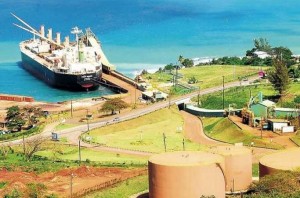Jamaica should strengthen its relationship with Noranda
I happened to read some content about the Noranda Company that wishes to expand its interests in Jamaica, increasing the size of its port, and wishing to negotiate some additional taxation terms.
A matter of ‘’Quid pro quo?” should not need a second look when dealing with business folk. It will be there, it is simply a matter of negotiation, ‘’who gets the beautiful bonus at the end?” Jamaica is hungry for work, hungry for employment, needing more industry for development, not promises and costing like those hungry Cossacks, and petty- wells that promise an eternity worth of dollars by the next election.
Noranda apparently seeks some waivers of tax over a time period, and then we can quantify the amount of investment they will make.
The company, Noranda now helps the poor parish of St. Ann in many ways to increase business opportunities; and I quote from well known representatives: JAMAICA’S bauxite industry, is now sorely missed in sections of St Elizabeth and Manchester, has a history of significant contribution to the economic and social development of the country.

Although posing disadvantages, the nature of bauxite mining has brought the industry into intimate contact with hundreds of thousands of Jamaicans, particularly in the rural areas.
The process of land purchasing, resettlement of land vendors, mining and land rehabilitation, employment, shipping, production, vast local purchases, and fiduciary and legal transactions, involves face-to-face dialogue with Government, employees, unions, communities, and other stakeholders with varying degrees of interest in the industry.
It goes without saying that there has always been a strong people factor at the heart of the operations, and it would have been the early contacts with small farmers that shaped the comprehensive programmes which embraced large sections of the population.
As an example, the industry landscape across St Elizabeth, St Ann, Manchester, Clarendon, and St Catherine is literally dotted with schools, colleges (STETHS and Belair as a start), playfields, community centres, clinics, roads, skills centres, businesses, housing estates, and water stations that all bear the stamp of Bauxite development assistance.
In a two-year period 1997-99, Alpart ( Part of Kaiser) built or renovated a dozen institutions, basic schools, community centres, playfields, and micro enterprise projects in the company’s immediate operating area. These are still operating.
Kaiser, Noranda, Alcoa, Alpart, have all been active sponsors of culture in their operating areas, and employee, company and community events continue to benefit from the companies’ investment.
With all these good works in the bag, flashback to the 1980s when, in spite of the social and economic capital invested, the companies found themselves staring down the wrong end of the barrel in an environment that was growing increasingly strident and demanding the highest standards of environmental practice, and required greatest economic greed. Communities were becoming more sensitised to environment standards and the companies were now at odds with neighbours over various matters.
The 1990s were marred by periodic community demonstrations in retaliation to alleged emissions and environmental damage and the community relations process, of which was severely tested by incidents which led to production interruptions, and supported picayune political aspirations.
Roadblocks, protests, sometimes even physical altercations, muddied the process of consultation and communication. Joint resolution of these problems was the answer and active community councils, with joint representation from community groups and employees, were formed to seek to resolve issues on a win-win basis.
Over the ensuing period, the success of this problem-solving mechanism was to lead to the councils developing abilities and capacities to include improved communication and project development as part of their relationship with the companies. The councils of today have gone way beyond the once volatile and aggressive approach, which once characterised the approach to environmental and monetary problems.
FAST forward now to 2015 when the latest industry player in Jamaica, Noranda Bauxite in Discovery Bay, enjoys a minor revolution in community attitudes when their partner, the Noranda Community Council, spent an afternoon with them recently celebrating the community development achievements of 18 Discovery Bay citizens.
For all these beneficial and dynamic reasons, Noranda and Jamaica should bind their sinews to continue building valuable relationships, irrespective of economics, and mere pecuniary gains.
REF: Juliann Richardson, Lance Neita

